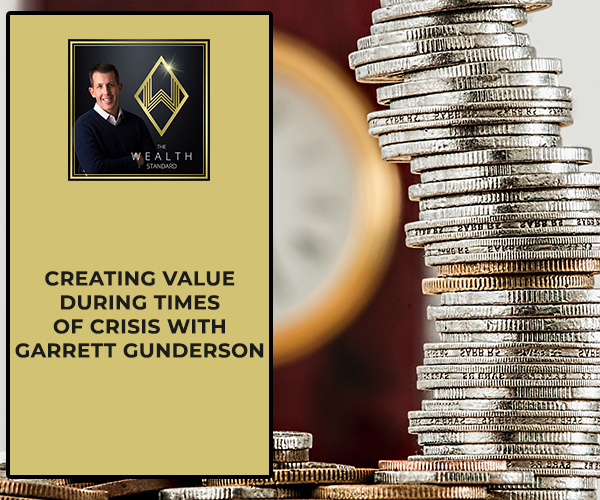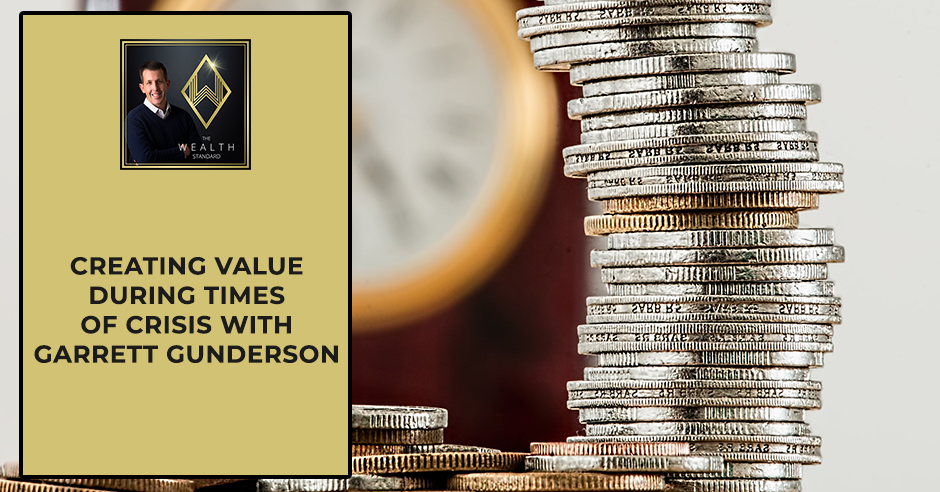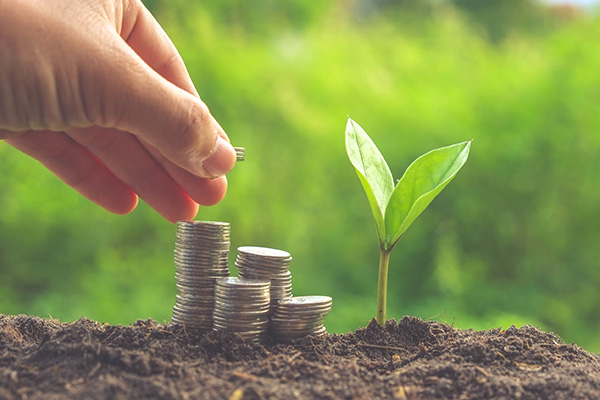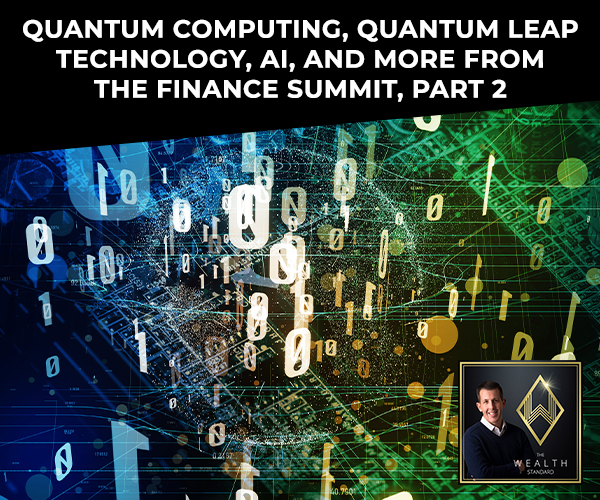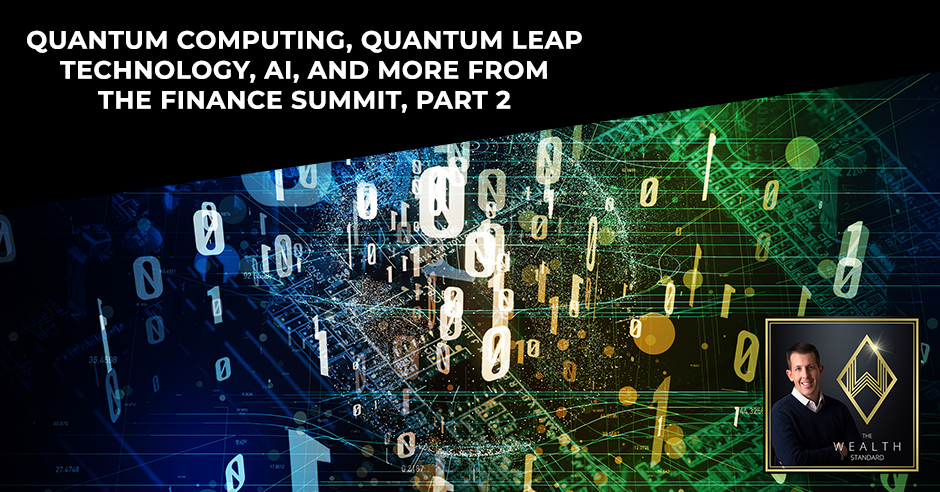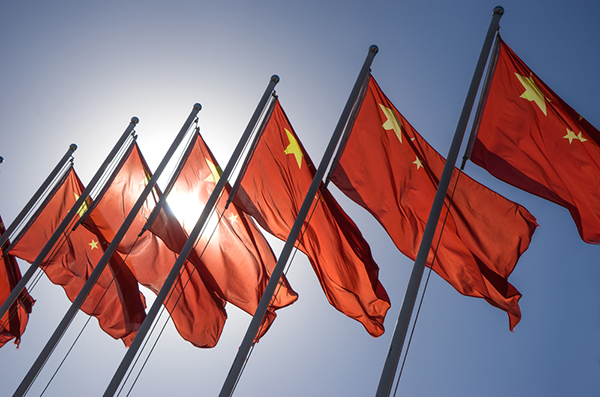The Concept Of Wealth And Winning In Life With Garrett Gunderson, Part 1
Podcast: Play in new window | Download
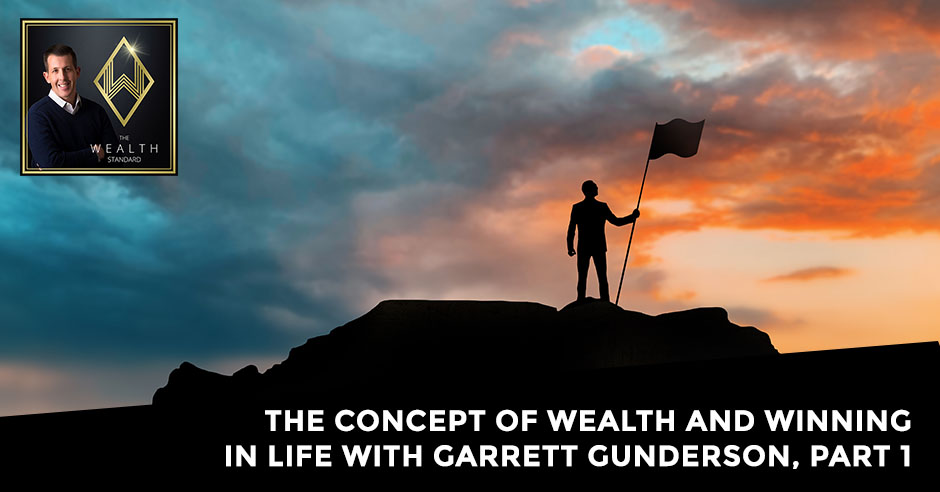
Winning in life isn’t easy. We all want to live comfortably and not deal with pain, but life doesn’t always work out like that. We will always experience hardships. Join Patrick Donohoe and the Founder and Chief Wealth Architect at Wealth Factory, Garrett Gunderson, as they delve into experiencing life with all its uncertainties. Garrett shares personal experiences that shaped him to be the person he is now. He also talks about how he dealt with his insecurities and allowed his vision to expand beyond his comfort zone. Finally, he shares how he was able to change things in his life in order to live winning it.
—
Watch the episode here:
Listen to the podcast here:
The Concept Of Wealth And Winning In Life With Garrett Gunderson, Part 1
There is a saying that embodies the idea of absolute and unwavering commitment. That saying is “burn your boats,” which is to say when you make a decision or a commitment, there’s no Plan B, escape clause, way to back out of the commitment. My good friend, has made a bold commitment. He’s made one of the riskiest moves that I’ve seen in a long time. He spent what most people would consider a fortune on training, coaching, Hollywood level film producer and production crews and other consultants to create this one-hour comedy special, primarily focused on the topic of money and personal finance. In June of 2021, I was fortunate to be invited to the live taping. It is seriously a Level 10. It met all expectations and exceeded them. It’s honestly hilarious.
Before this film is made available, Garrett is going to be doing a multi-city tour and it may be coming to a city near you. Why did he do it? Why comedy? I would say the taboo topics of politics and religion have a stepchild, which is money and personal finance. The stack of cognitive biases that prevent the mind from rationally evaluating financial strategy is pretty thick. The exception is someone having an open mind. However, the rule is what’s familiar with the status quo it’s to stay on that course.
Garrett hypothesizes that humor is a catalyst to breaking through these filters. He’s written books, three of them, one of them, a New York Times bestseller. He’s been in the space for many years. Despite what most would consider a success, his mission is to break through what keeps holding people back from living a life they truly want. He’s spoken on videos has a broad social media audience. He’s taken his message, he believes, as far as he can go. In this three-part video podcast series, you’re going to learn a few things about what he’s doing and why he’s doing it.
Number one is how powerful ideas have made their way into our belief systems with any vetting, scrutiny or evaluation and how difficult it is to go back and objectively understand these beliefs without shortcuts, such as humor. Number two, you’re going to learn a unique perspective on wealth and what people are after with their goals like retirement or financial freedom. In the third episode, we’re going to talk about Garrett’s journey where he’s put his essentially successful career and reputation at risk, and why he’s done it and everything that has led up to this point in time and decision. You guys are going to love these episodes. I can’t wait for you to experience this new content from Garrett to learn more about his tour and if it’s coming to a city near you, go head over to FreeFlow.group. Enjoy.
—
What is interesting about what I’ve learned from you because of this pivot that you’re making is when you have this humor, first off tapping into that, you got to be vulnerable. I’m not sure if you can fake funny. Maybe you can. I don’t know, but I feel like that’s the genuine person when they’re funny. Number one, I think it brings down those barriers, but then number two, comedy in general, talk about taboo things, off-limits things. Even if you go to Chris Rock standup or Eddie Murphy standup, they talk about hardcore shit you don’t talk about at a dinner table or a conference.
Going through rough times is okay. You have to learn how to process through pain. Click To TweetWithout the comedy, it’s like canceled. People are angry.
I think that’s an interesting dynamic where these experiences that you’ve had have taught you about personal finance is a challenging industry. You’re always up against belief systems, but you figure out a way where you tapped into something genuine by yourself, able to connect with people at a different level where they’re now open to talking about what was off limits before.
I wrote this poem and part of it says, “Comedy is the key when no other will do. Love is the answer but can’t always get through.” Satire is pointing out what we hide, but everybody already knew. That’s my summation of why comedy is so profound because they say that when you scare someone to death, they remember. I don’t want to do that to people. It’s almost as effective to make someone laugh. I was talking to my sound engineer. We’re doing the final processes of a special. He goes, “There are so many gut punches in this. I’m a specialist. I have to be candid with you. When they told me what you were doing, I thought, how is that ever going to work? It’s great.” It’s cool to win over some intense critics in that world with a lot of like stature and knowledge. Some of it hasn’t. Some pay me to do. It’s a joke that happened to come out that night that I was not expecting to say. It was too funny not to include, but I think that theme is there. I think that it’s going to help the masses face a topic that they’ve been afraid of.
I’ll make one more comment. I don’t want to get into some topics specific to the special but also your experience. I’d say that, as you look at humor, roasting, whatever comes to mind when Demi Moore was roasting Bruce Willis. It was fascinating because those are things without that platform. The conversation does not take place. It’s almost like society has gotten to this superficial level, which I think we’re all involved with. It’s who you are, but then it’s who you are in public.
There’s a joke in my special that my manager is scared of. You’ve heard the joke because you were there. I’m talking about kids that they don’t labor. They don’t need Labor Day off. Driving around at Uber isn’t labor. We’re going to Jamba Juice that’s typing on a Zoom meeting isn’t labor. Having a baby is labor. That’s why they call it that because it’s hard ass work that wrecks the woman’s body. Ladies, you deserve a few hours off afterward. He was like, “You can’t say that joke.” It’s a joke because it’s stupid that guys would say something like that or feel that way. That’s what makes it funny. It’s not like I’m saying it as a sexist. I’m saying it as the opposite. How stupid are we? That’s why you get a laugh out of it, but we’re a sensitive society.

Winning In Life: One of the driving forces of human beings is freedom, including financial freedom.
The sensitivity is that conflict between who we are in public and internally. I think that gap continues to widen. These are thoughts everybody has, but nobody’s willing to express because it would violate some stigma associated with their public personality or profile.
My set’s pretty clean because it’s not made much funnier with vulgarity. I want to have a reach. In my everyday life, I swear a lot more than when I’m on camera. I’m also thinking about it like, “Does it add to it?” There’s plenty of jokes that I remember. I posted one of my comedy sets, and someone was like, “This was supposed to be cleaned. The sexual innuendos here are so Philly.” I have a filthy mind, what am I going to say? I don’t want to mute myself. I want to be able to say things that other people can’t say and that’s what makes it funny.
I also want them to remember some things that help them in life, but the goal is to be funny first. It’s not another lecture. I am truly declaring myself a comedian based upon who’s involved with the project, and I think, “Where it’s going?” I remember I did a practice run for a group of your advisers. You were laying on your side at one point laughing at my insurance jokes. I was like, “This is fun. This is good.” That’s good because I was doing a lot of Zoom at the time to prepare. Zoom is not as fun as people in the same room as you. You can only hear laughter one way a lot of times on Zoom. It’s been a challenge, but a good one.
Let me hit on something to pivot the conversation. You want to get through to people to help them, paraphrasing. When we first met, there was a sincerity and genuineness about you where you wanted to make a difference. You talked about the things that you thought were most important for other people to know. Your journey led you to the point where even though you were saying the things that would help people, there was resistance on that initial layer that they were not able to get past. Therefore, they weren’t helped. Maybe get into where you’ve come with your understanding of what wealth is. What are people pursuing? Maybe unpack why aren’t people achieving levels of life that they want, especially in a society where all the information, all the books, everything’s there to do it, but people are still stuck in a sense?
Wealth to me is knowing what your win is and living by your rules and win, not everybody else’s. We lose well when we try to conform to society, to please others at our own expense, buy into this notion that this is going to be a temporary thing, that we’re going to give up so much of what we enjoy so that one day we can find a live a life that we can love. The problem is those habits become who we are. I had this conversation with someone that said, “I’m leaving social media.” I’m like, “How are you going to do business?” There was business before social media, there will be business after, but social media is not part of my win, my wealth. I don’t want to have digital assets where how I’m viewed is based upon the number of subscribers, of likes or of comments.
It’s important to know how to show and choose love even when it's difficult. Click To TweetI start thinking superficially about what would be viral or what would be controversial versus being who I am. This is a weird notion, but I’ve had like a Renaissance in my life where I decided hobbies were going to be as valuable to my wealth as my business activities. They would be on par. They wouldn’t be beneath that. I started taking courses on being a barista. My friend, my client, and I built this thing called The Roast, which has got a big bougie seat to pull up behind my e-bike. It’s got a chalkboard that you open up, an expresso machine put up there, a generator on it, and a sound system. I could roast coffee while I roast bad financial ideas. It’s almost like jaywalking would be on the street.
I’m like, “That’s fun.” I became a whiskey sommelier, and then I started learning how to fish, taking classes at Trager. I went and shot an elk with a bow. I started doing these things that weren’t anything to do with money. They were about my enjoyment. I started thinking about like, “What art do I enjoy in life? What are art forms that I would do for myself?” I write some poetry sometimes. Obviously, comedy was part of that. Some of that crossed over into a business world or a financial aspect. The start was considering my life and myself valuable enough to take time for myself for no other reason than I would enjoy those moments. Not because of validation by the external world. By doing that, I feel like I could be more connected to the world versus having the world tell me what wealth is or what my win is. That has been this revitalization of my life in the last few years. I feel more inspired, more ability to connect with people.
A lot of my hobbies have to do with satiating experiences, either meditative experiences or satiating. Satiating experiences are how I can create conversations that lead to connection? When I’m making a latte, I’m listening to someone. We sit down, have that latte and have a conversation while we sip on that latte, which prolongs that conversation. I started smoking a tobacco pipe maybe once a week or so. I ended up doing that with my dad, who grew up a Mormon. That was a surprise that he enjoys it. They texted me talking about he was having some tobacco and pontificating something about life. My mom’s like, “That reminds me of my dad. He used to smoke every Sunday.” I was like, “That’s a 30-minute smoke.” It was a beautiful artifact.
I started to invest in hobbies. I have this philosophy in life that I win when I play. I play doing comedy. Even my new website I’m writing now, I’m writing things that are funny and enjoyable that are part of that process. I created life on my rules and on what my win is. I’m not trying to retire from anything. I’m not trying to run from anything. I’m no longer trying to hide from anything. That can be difficult at times, but it’s so rich and rewarding. That’s wealth. When you know your win, and you’re living your life based upon winning all the way along, not about arriving somewhere.
That was the point I was going to make. I would say follow-up question because this is something that I think most people would resonate with. That would be nice. They look at you, others that fit that persona. They say to themselves, “I have to do this first in order to do that.”

Winning In Life: Pain is a gift even if we don’t like the wrapping. It’s a tap on the shoulder so that we could do better.
That’s sacrifice. Unfortunately, we learned that through conversations and culture. Did you ever play the Game of Life, the board game?
Yeah.
The only way you win is by getting your college degree in that group. That creates a subtle belief about why we have to go to college. We played Monopoly. How do you win a Monopoly? Get as many things as possible. It’s a zero-sum, winner-take-all game. We start buying into that belief with capitalism. It isn’t what true capitalism or free market would be. It’s what cronyism becomes. It’s the survival of the fittest versus collaboration. I’m like, “I’m playing games that everybody else told me to play, go to college, get a degree, have a big business, grow that business,” which was always about, “I’ll take care of my health later. I’ll have time for my family later.” Those were always in the background and then the great line that all business owners never tell their spouse, which is, “I’m doing this for you,” but it’s not. It’s for our fulfillment of our narcissistic ego. There’s an unfillable void of more is better. All those kinds of things that we learn in society, especially here in America.
There is merit to some of that. There’s a lot of false reward to a lot of that, especially when we’re trying to prove something to other people. I was practicing my comedy set and I had a terrible night. It was on Zoom, had some people on, including someone who used to coach me in speaking and I had some friends in the dining room. There’s a chef in the kitchen. It was at my friend’s house. My wife’s doing her culinary homework in the kitchen. It’s noisy. They’re like, “How long can you be done in an hour?” My set is an hour and a half. The worst thing you can do is take an hour and a half in comedy and make it an hour.
The best thing you can do is go, “I won’t share a third of my set.” I condensed it. The guy said, “You sucked.” I did. That’s the truth. It wasn’t good. What was hard is not to have that be a chip on my shoulder and be like, “Wait until I do this.” What I did was I waited, and a month later, I finally shared it. He goes, “I can’t believe that it’s the same thing.” I’m like, “Yeah, I had an off night.” I definitely did. I learned a big lesson from that. The big part of the lesson was along the way, enjoying it. It’s not waiting for April 15th, but being like, “I had this set in March in Ogden at the Wise Guys theater there.” It was like, “It was an amazing set. It was one of the best nights.” I’m like, “It wasn’t. The April 15th was good.” As a standalone, that was a win. That was an enjoyment. Enjoy that moment. Extract that moment. Even leading up to that night, the last line, I thought, was awesome.
Intuition is such a gentle nudge. It's an inner note and a gut feeling. Click To TweetI couldn’t wait to sit. I was like, “I want to enjoy every moment on that stage.” Often in life, we’re trying to get to the next moment. It’s a silly movie. A movie that impacted me was Click. He could fast forward through anything. He missed everything. Most people would do that without proper perspective. We’ve learned that pain is something to avoid. What I’ve learned is pain is part of the process. It’s a gift even if we don’t like the wrapping. It’s a tap on the shoulder. If we’re willing to go through it with love and compassion, the other side of that pain is always a connection and lesson. My wife walked up to me and I’m like, “What’s up?” She’s like, “I’m sad because trying to get our son in this camp, but he’s got to have certain vaccinations.” My son had an adverse reaction to a vaccination back in the day. He’s not up to speed on certain tetanus and polio, which I don’t even understand why he had to have that. She’s like, “I don’t think they’re going to let him in the camp. He’s struggling with friends.”
I was like, “If you need to call the camp and have me on the call, I’ll be on the call.” Otherwise, I was doing my best not to get sucked into thinking that I have to make her happier. That’s my responsibility or that there’s something wrong with her being sad. She was able to get a hold of the camp and they’re going to let him in. Even when she did, I do a lot of times, which is we suffer the future. We start thinking about what’s coming up, about what can go wrong with that? We start our suffering now for something that hasn’t even happened and 99% of what we worry about never is reality. The stuff that is the biggest problem is things we could have never predicted. I feel like we’re going to have the tools and have the lessons through those, even if it is painful. The people that struggle the most are the ones that try to avoid the pain, hide and run from the pain, go around the pain when going through it is the only way.
I was reading Meditations by Marcus Aurelius. The definition of a meaningful life hasn’t changed at all since then. Yet, the world has become more complex. It’s been more difficult for people to have those moments of meaning.
We are better at faking things now. We have tools to make things look and feel real.
It makes it even more difficult.

Winning In Life: When we try to conform to society and please others at our own expense, we’re going to give up so much of what we enjoy.
Filter and social media editing, I don’t know how to describe it without sounding too crazy, but I’ll say it. I’m at acupuncture, relaxing. I have this moment of clarity. I felt like it was God say, “There’s nothing to worry about. I’ve got you. You’ve got this. When you make mistakes tonight, it’s part of the process. Make that it’ll be okay.” I didn’t make as many mistakes in Show 2 as I did Show 1. At Show 1, I forgot where I was at one point. This girl, Trivinia was laughing so hard. I got distracted because she thought the word cavemen are funny. I kept saying cavemen, but then at the end, I go, “Does anyone know where I’m at?” Everybody started laughing because I’m making a mistake. My manager yells out. I picked it back up. In the second show, the mistake is, remember the tooth bunny. I meant Easter bunny but said, “The tooth bunny.” That stayed in the special and it was a mistake, but it was funny.
I had talked about the Easter bunny. No wonder we have a problem with pedophilia. You have a stranger in a costume here. Kids go to them and they’ll give you things for free. I go, “That reminds me of a story with my wife,” and everybody started laughing because the last word was a pedophile. What it was supposed to be referencing was free because she went to spring break when we were dating instead of, “I don’t need any money because the guys are super nice. They’ll give you drinks for free.” Those were accidents. Those were mistakes that made it funnier. The fact that I went in with this knowing I was able to be in that moment without fear. I didn’t tense up. I laughed with you guys.
I rolled with the punch. In life, we try to control the uncontrollable and that creates unnecessary stress and worry. That worry starts to become who we are instead of who we really are. Everybody gets a dumbed-down lesser version. That’s not present because of how we handle pain, of what we think is right and wrong, and of how we don’t want to be judged. Ultimately, we don’t show who we are because we think that if we’re someone else that people like us more. That’s my estimation.
I’ve done a lot in my life. I don’t think you can completely avoid that. It’s part of our makeup. We’re aware of it.
I have too many windows open that are running in the background, still learning the software down. I can be like, “Why am I worried about that? I’m going to call that person. This person texts me back. Do they not like me?” I’ll call him instead of sitting there and like worry about it. I always think, “Maybe they have other things going on,” or maybe a lot happening is in their life. If they don’t like me, that’s up to them.
You’re walking on the side of the road and met a stranger. You have ten minutes to talk to him. What do you tell him? We’re all human beings. We all essentially suffer from the same programming in a sense. We’re all part of the experience where stuff happens and respond to it in very similar ways. It’s this never-ending pattern that we get stuck in. You’re talking to someone for a brief period of time. What do you say?
Wealth is knowing what your win is and living by your rules. Click To TweetWhat would life be like if we trusted ourselves more? What would life be like if we listen to our intuition? Intuition is such a gentle nudge. It’s an inner note. It’s a gut feeling or a light feather face. It’s super easy to ignore, but the more we ignore it, the more we have unrest, even depression. We succumb to scarcity. Intuition doesn’t always lead us towards the easy path. That’s the thing. That’s why we like to ignore it sometimes. Sometimes it leads us down a challenging yet rewarding path. Sometimes because we think that we’re too alone or we’re not capable or haven’t been done before.
When I say we, I could be good at talking myself out of any of this. I had hernia surgery, November 3rd, 2020. I was in my bed for several days. I was eating gummies for pain management to go to sleep. I didn’t want to take any opioids. I don’t do good with weed at all. It makes me disconnected. I can’t even formulate good sentences. I found myself being like, “I think I could be a comedian. This is stupid. This is dumb.” That time I was like, “I think I’m going to do a special. I’d written it out.” I turned on The Zen Diaries of Garry Shandling that was done by Judd Apatow. It was him talking about his doubts of ever being good enough to be a comedian and all this stuff. I was like, “Okay.” He has some cool things he wrote in his journal, which reminded me about things I’ve written in my journal. I was like, “I’m going to do this. Can you walk downstairs because of surgery?” November 15 was when I called comedian Marcus and said, “I want to write this. Do you want to help me?”
I think we could write a special by January and then I’m very cats. My managers, chemistry starter podcast, email, somebody does it April 15th. I was considering it. All of a sudden, a brand new comedian is going to film an hour special. I started writing November 15th. I remember April 15th where most professionals are going to take a year to do this. I’m on Zoom five days a week, testing this out. You were there for one of them. I’m like walking, reciting, rowing and rewriting. It worked out great, but it was uncomfortable. I had to face so many demons of insecurity, of how to be direct with people, how to ask for what I want and to allow a vision to expand beyond my comfort zone, to make changes and to like say no to things, I could truly focus on this, how to allow other people to support me.
There were many things that had to go on for that to occur. Who I am from January 2020 to who I am now? I feel like I have to reintroduce myself to the world from who they knew in the past. I’m willing to listen to intuition. I’m willing to do the harder things and process through pain. I’m convinced on other side is love and connection. I feel worthy of love. I feel that I still have insecurities, but I still love myself even if I’m imperfect. I’ve adopted a statement perfectly imperfect as part of my life. I don’t have the answer, but I do have the question.
My question at all times, whether it’s convenient or inconvenient, is what would love choose? What would love do, how would love show up? I used to think that what was most unique about us was our abilities because that’s maybe a strategic coach concept. What makes us most unique is how we show love, express love, receive love. I’m like, “What if I mastered that? What if I invested in that?” Not in all the other stuff about more, but how to show up as love, how to choose love when it’s difficult, when I want to pout and be a victim, when someone I feel is wrong, me or said something negative about me? It’s like someone I look up to when I said, “I don’t want to be part of this anymore of something I was on the board.” He was like, “That’s going to impact us. “

Winning In Life: When we try to control something that is beyond our control, it creates unnecessary stress and worries. That worry starts to become who we are.
I’m like, “I know, but you’ll figure it out. What am I going to do? You always found a way.” In the past, I’ve been like, “You’re right. Let me do it even though I don’t feel like I have the time or capacity or that I don’t feel like this is my calling because I want to appease you.” I was like, “We can still be in a relationship. You can even go tell people I’m an ass and I’ll be okay” because I’ll keep showing up as love and part of the time is having clear boundaries. It’s ten minutes of what I would tell someone.
What I took from that is the question you ask yourself, especially when you’re experiencing fear or anxiety or stress.
This shit’s easy when things are good.
The primal part of us shows up when things are not how we expected. Number one, it’s the awareness of it. Number two, it’s not relying on those carnal instincts. It’s strategically designing a way in which you can ask yourself different questions and catch yourself. Obviously, be more present and enjoy that moment.
I don’t know how you feel about this. The way I feel about this is I have the ultimate testing ground and having a wife and having kids because I can be neutral about things in business and not take much offense to it or not have a drag me into drama or a lot of emotion. If I don’t get my way with my wife, I can find myself on a path. I could find it harder to ask for forgiveness immediately or to not be right at the moment. That is the ultimate place because I’ve shown her more of who I am and I’ve shown anyone else in the world. There was a time where I believed if she didn’t love me, I wasn’t lovable because I’ve shown her so much. When I recognized that was a limiting belief, I’m able to even give her more love without the fear of is it reciprocated or what if she doesn’t like this about me? I joke that this is like the 26th version of who she’s been married to. I’m like the only woman that’s been married to more men with one marriage is Danielle White. Garrett White’s wife. He’s on Version 35.
It’s one of those things where I hope that’s what we all pursue. I don’t think there’s this end to our becoming. It’s weird. You have so much brilliance and meaning when you’re living in the present moments. That’s what all exists, but it’s this constant awareness that you can continue to do iterate, improve and be better, not to take away from how you are right now, but be even better and continue to improve on the experience.
Important Links:
- Garrett Gunderson – LinkedIn
- Learn more about Freeflow by contacting Aaron@freeflow.group
- Meditations
About Garrett Gunderson

I am the author of the New York Times and Wall Street Journal bestselling personal finance book Killing Sacred Cows: Overcoming the Financial Myths That Are Destroying Your Prosperity.
Founder and Chief Wealth Architect of the Inc. 500 firm, Wealth Factory. A regular on ABC’s Good Money, he has been on Fox, CNBC, as well as hundreds of radio interviews, and I contributor for Forbes. I also am a frequent speaker at workshops and conferences and live in Salt Lake City.
I have also been interviewed by some of the greats in the personal development space like Hal Elrod, Robert Kiyosaki, Ryan Moran at the Capitalism Conference, Dan Sullivan from Strategic Coach, the Mindvalley Podcast, Project Life Mastery with Stefan James, Joe Polish of Genius Network, Entrepreneur on Fire with John Lee Dumas, The Science of Flipping with Justin Colby, The How of Business, and many more!
Love the show? Subscribe, rate, review, and share!


